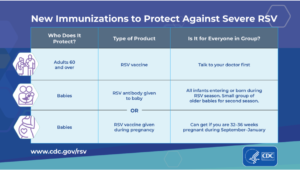Leaves are falling, the weather is getting cooler, and with the change of the seasons, Americans face an increasingly complex landscape of respiratory diseases and seasonal issues. However, it does not have to be quite as dismal as it sounds, as there are many vaccination options that are available.
Traditionally, the advice in years past has been relatively simple: get a flu shot.
However, in a post-Covid world, there is a new level of complexity that has been added to the vaccination landscape. This year, for the first time, a third shot is center stage – a vaccine for respiratory syncytial virus (RSV) which poses particular risks to infants and older individuals.
With three bold choices designed to help keep you safe, let’s take a closer look to see the latest recommendations and developments regarding these fall and winter vaccinations.
The Flu Vaccine: Your Fall Essential
The advice revolving around the flu shot remains unchanged. “Everybody should be getting a flu shot,” emphasizes Dr. Paul Offit, a prominent expert in vaccines. If you are eligible as defined by the Centers for Disease Control and Prevention (CDC), meaning you are six months of age or older and do not have any extenuating circumstances preventing you, you should absolutely be getting this vaccination.
Due to the fact that the effectiveness of the flu vaccine fluctuates from year to year, getting a seasonal flu shot gives you a boost (between 40-60%) in preventing flu illness. Despite the variable effectiveness, getting vaccinated is crucial due to the fact that by protecting yourself, you are in turn helping the more vulnerable populations who are more susceptible to severe illness, hospitalization, and even death to stay safe.
The Ongoing Challenges of COVID-19
The COVID-19 vaccinations continue to evolve, and this year is no exception with an updated COVID-19 vaccine that has recently taken form. This vaccine is being classified as a vaccine versus a booster, due to the ever-changing variants of COVID-19 (much more like the flu.) In June, the FDA’s expert vaccine panel recommended an update from the then-current vaccine targeting Omicron variants BA.4 and BA.5 to focus on a new variant from the XBB family.
Recent variants have emerged since these decisions, but thankfully due to early tests from Moderna and Pfizer – they believe their XBB vaccines can still neutralize the latest variants due to the T-cell immune response generated by previous versions of the vaccine which protects against broad range of variants.
Decisions about who should be receiving this latest updated vaccine are still pending guidance from the DFA and CDC, and the recommendations vary among experts. Some believe healthy individuals who have completed their primary vaccine series and received at least one booster dose may not require another booster. This decision is mostly due to the fact of the robust T-cell response generated by the earlier vaccines which is still strongly working against new variants.
Here is what Dr. V has to say about getting your COVID-19 vaccine:
Based on my 20 + years as a physician, I am a firm believer in vaccinations. In addition to the initiatives for clean drinking water, an effective wastewater management system, and the advent of antibiotics, vaccines have had an unimaginable positive impact on avoiding serious illness and saving lives. My family, my mom, and I have received every vaccine for which we have been eligible. I would advise all of my patients to make sure you are vaccinated.
However, expanding of booster recommendations may depend on evolving data regarding virus mutations and hospitalization rates among vaccinated individuals. Vulnerable populations should keep a close look at the most up-to-date recommendations for added protection.
RSV: A New Addition to Your Seasonal Vaccine Lineup.
This fall brings with it a new vaccine against respiratory syncytial virus (RSV), a threat primarily affecting older individuals and infants. RSV has sent thousands of children to the hospital annually and has contributed to a massive number of deaths among those 65+.
With the protection of our oldest and youngest populations in mind, two types of preventative measures have been approved:
For Older Individuals: Pfizer has an FDA-approved vaccine for individuals aged 60+ and more information on this new vaccine can be found here.
Monoclonal Antibody for Infants: Recently Sanofi and AstraZeneca have developed nirsevimab, a monoclonal antibody approved for babies under eight months old. Where nirsevimab may not be available or feasible to administer this season, palivizumab is available as a series of monthly doses. (It is important to note high-risk children who received palivizumab in their first RSV season should receive nirsevimab in their second season if it is available.) This differs from a vaccine in the sense that it introduces passive antibodies into the bloodstream of infants to provide protection.
Here is an infographic from the CDC to help you navigate the landscape:

The excitement this new vaccine provides to these two populations also brings with it a level of complexity, particularly regarding pregnant individuals and babies. While the recommendations for the older population are fairly straightforward, the situation for mothers and infants remains to be a bit more challenging, if you have any questions about your unique situation be sure to advise your obstetrician and/or pediatrician.
Got Questions? Reach Out!
We know here at Los Gatos Doc that the vaccination landscape can be one of a very intricate design, and that each of us has different needs when it comes to our own recommendations. It can be challenging to decode the different data and guidance from health authorities, and that is where we come in!
When you are ready to schedule your seasonal vaccines with a primary care physician in Campbell, CA, or even just to have your questions answered, give us a call today: 408-502-6040 and we will discuss the best ways for you to safeguard not only yourself but our community at the start of this new season.





